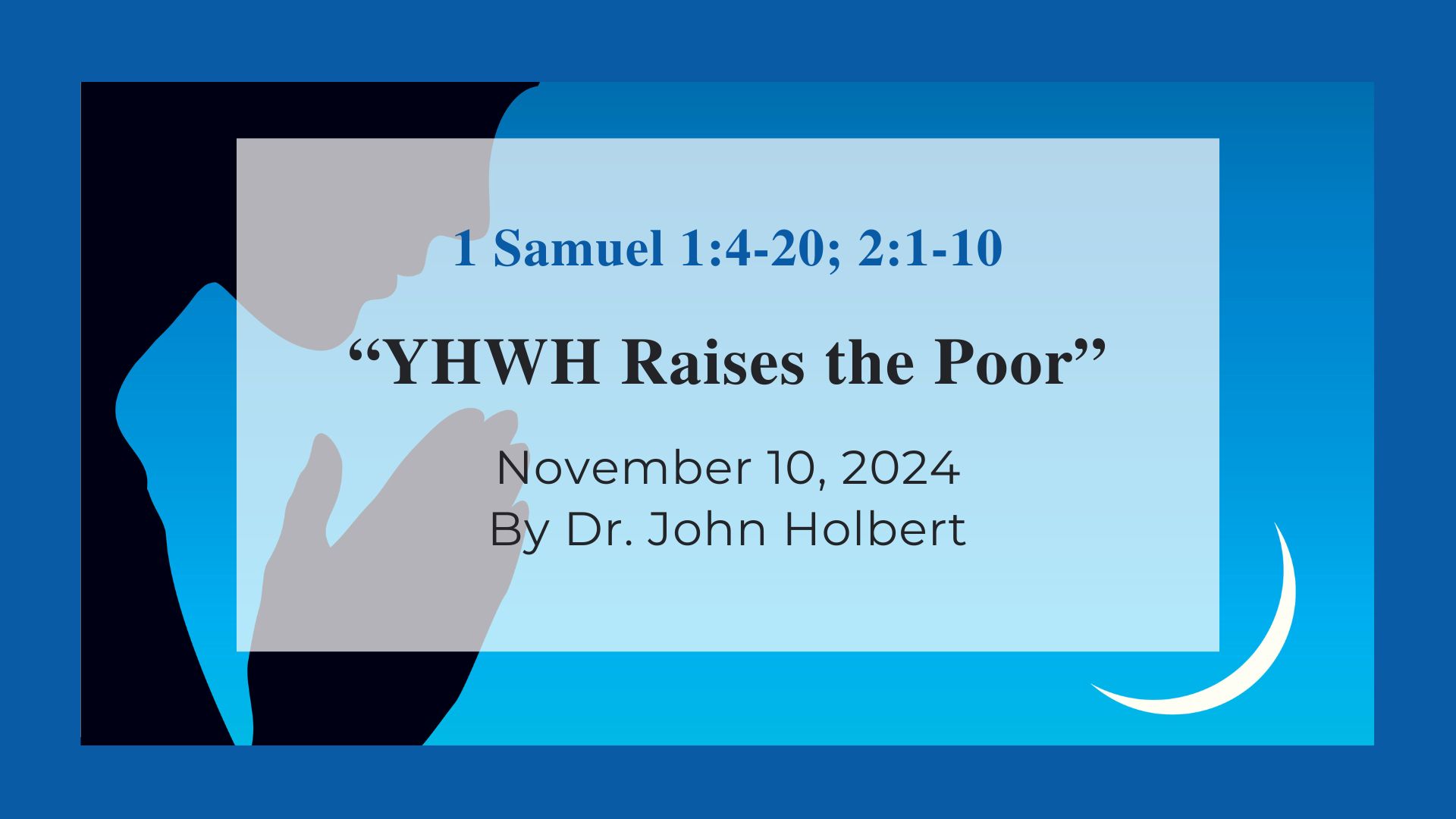YHWH Raises the Poor -- Reflections on 1 Samuel 1:4-20; 2:1-10, Proper 28, Year B
by John Holbert on Monday, November 11, 2024

Proper 28. November 17, 2024. 1 Samuel 1:4-20; 2:1-10. “YHWH Raises the Poor”
As the church year creeps toward another Advent, the anticipation of the coming of Jesus into the world, our lectionary texts take on a special importance as we preachers try to discern and communicate to our congregations what this coming one may bring to a hurting planet. We have just endured another election cycle, with all its pain and hope and confusions. I am writing this essay long before that election, so I cannot imagine just which way it may go, but I do know that celebrating the Advent of the Christ is something we do each year, and always need to do as an antidote to the events of a far more transient nature—like presidential elections. Today, we go back to 1 Samuel to discover one of the most important and consequential gifts of Advent, namely the certainty that the coming one will bring a pronounced concern for the poor and the needy. Presidents and their promises come and go, but Jesus the Christ remains committed to the unification of the cosmos, thus lifting up the poor and needy as integral components of that unification.
1 Samuel 1-2 in its very human story of a woman first scorned and then triumphant, ushers us into this larger tale of universal hope. Hannah’s prayer makes that connection plain; her personal victory presages a wider victory for all of creation. The story begins commonly enough. Elkanah, a man of the hill country in the north of what was to become Israel, had two wives, Hannah and Peninnah. It was apparently not unusual in those long-ago days for a man to have two wives, just as certain cultural and religious traditions make possible even today. But these two women are quite different in one particular way. “Peninnah had children, but Hannah had no children” (1 Sam. 1:2). It is, of course, a familiar biblical narrative. Immediately, we think of Sarah and Rebekah whose birthing was delayed, but once able to produce children presented to the world important children indeed.
In this case, it is not Elkanah’s problem that Hannah had no children, since her co-wife had children aplenty. Year after year, the family would head to the local shrine at Shiloh for sacrifice, and Elkanah would dole out portions to each family member so they could offer their own sacrifice to YHWH. Unfortunately, the Hebrew text here is difficult. It could either mean that he gave only one portion to Hannah, while giving more to the other family members, or it might imply that he gave a “double portion” to Hannah, because he loved her, as the text goes on to say, and YHWH had closed her womb (1 Sam. 1:5). I tend to favor the former meaning, simply because later Elkanah is portrayed as quite unsympathetic to Hannah in her childlessness, saying to her, “Am I not more to you than ten sons?” (1 Sam.1:8). I can imagine Hannah saying, at least to herself, “Frankly, my dear, no you are not!” However we are to hear this part of the tale, the story continues by describing Hannah as taking her own initiative at Shiloh.
She went to petition YHWH, and vowed that if she was able to birth a son, then that son would be a “nazirite,” that is dedicated to the service of YHWH “until the day of his death” (1 Sam. 1:11). The high priest in the temple was Eli, and he witnessed this heartfelt prayer, but mistakenly took it for the slurred speech of a drunken woman. It will not be the last time that Eli misunderstands communication from YHWH (see 1 Sam. 3). Hannah says to him that she is not drunk, but in anguish due to her barrenness. Eli perfunctorily bids her leave the temple in peace.
She returns home, and after a healthy sexual encounter with Elkanah, conceives a child. When the boy is born, Hannah herself names the boy Samuel, because, she says, “I have asked him of YHWH” (1 Sam. 1:20). There is irony here, because the verb “ask” more closely resembles the name Saul; Samuel means something like “God hears.” In any case, she fulfills her vow, albeit not until she weaned him, and brings Samuel to Shiloh for his life-long service to YHWH. And then she prays the prayer that undergirds the more famous Magnificat of Mary in Luke 2.
In both prayers the central claim is that with this birth the expected order of things in the world has been changed forever. “The bows of the mighty are broken, while the feeble take on strength” (1 Sam. 2:4). “The barren has born seven, but she who has many children is forlorn” (1 Sam. 2:5). “YHWH raises up the poor from the dust and lifts the needy from the ash heap to make them sit with princes and inherit a seat of honor” (1 Sam. 2:8). As the tale of Samuel unfolds, these promises are at times partially fulfilled and at times are completely forgotten. However, in the ongoing narrative of Jesus we can see clearly that common expectations for the world are called into serious question as the poor are raised, the blind see, the deaf hear, prisoners are freed, and the needy hear the power of the good news of God spoken to them. Hannah, like Mary, speaks to the new thing God is doing in the world, that new thing that promises unity and wholeness on a fractured planet. In short, Hannah’s prayer makes us all the hungrier for the Advent of the Christ, and next week on Reign of Christ Sunday, we will celebrate the end of anticipation and bring in the quite active hope of the near arrival of the one we had long hoped for.
